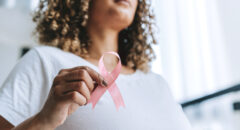
Self-care has become a buzzword in the past few years. Headline after headline boasts the importance of self-care and which products can get you there. But self-care isn’t just for the privileged few who have lots of extra time and money—it’s an intentional practice that we can’t afford not to make time for in our busy lives. Data shows that self-care needs to be part of the treatment plan for Black Breasties.
But what exactly does self-care look like for Black Breasties? And how are you supposed to make time in your already busy day?
“In a way, it has felt like I’ve been holding my breath,” metavivor and breast cancer advocate Deltra reflects. “Self-care is giving space to breathe.”
The first step of Breastie self-care needs to be self-recognition: you are holding so much, you have done so much, you are allowed to take time to refill your own cup. The responsibilities and expectations of being survivors/thrivers, parents, daughters, partners, breadwinners, the many roles you’ve been given, can leave you with barely any energy or time left over for yourself.
As metavivor and breast cancer advocate Lakia puts it: “I do a phenomenal job taking care of everyone else. I take my medicine when I’m supposed to, I do the things I’m supposed to do, but am I doing what I really need to be doing? Have I done any self-reflection? Have I cried about being diagnosed?”
Take a moment now to check in with yourself. What do you need? Give yourself permission to ask for it, to see that need through. This is the second and third step of self-care for Black Breasties—trust yourself to know what you need and give yourself permission to fulfill that need. It’s not selfish, it’s just as important as taking your medications or going in for a doctor’s appointment.
RELATED: 6 Self-Care Practices & Rituals That Everyone Could Benefit From
While self-care is different for each person, TOUCH, The Black Breast Cancer Alliance suggests a few core pillars that can help guide Breasties as they develop a personalized self-care routine:
1. Movement
- Black women who exercised for three or more hours a week had a 47% reduced incidence of an aggressive breast cancer type.
- Women who exercise 2.5 hours per week, before and after being diagnosed with breast cancer, had a 55% lower risk of recurrence.
- Results from the NIH-supported Women’s Health Initiative Observational Study (WHI-OS) found an increase in fracture risk among breast cancer survivors. Protect and strengthen your bones with weight-bearing and resistance exercises.
How to: therapeutic yoga, a dance party, tai chi, walking, jogging, weight-bearing exercises
2. Diet
- Eating a healthy diet that is high in fiber and low in saturated fats is key to healing your body and can help prevent recurrence!
- Breast cancer survivors who eat a diet high in vegetables and low in carbohydrates have a lower risk of death.
- Women who survive their breast cancer are at high risk for significant bone loss. Eating healthy and drinking less alcohol can help maintain bone density.
How to: limit your alcohol consumption; eat calcium-rich foods to strengthen and protect your bones; prioritize dark fruits and vegetables like berries, chard, spinach, broccoli, and brussel sprouts; try whole grains; make sure that you’re getting enough Vitamin D through supplements, sunshine, or Vitamin-D fortified foods
3. Mindfulness
- Even brief mindfulness-based interventions have been shown to reduce stress, behavioral symptoms, and inflammation.
- Mindfulness has been shown to lessen symptoms of metastatic breast cancer, including pain severity and interference, fatigue, psychological distress, and sleep disturbance.
How to: meditation, massage, journaling, restorative yoga, soaking in a bath, self-reflection
4. Community
- One study, in particular, found that Breasties with more social ties are less likely to have a recurrence and less likely to die from breast cancer.
- Social support is linked to increased quality of life for Breasties after treatment.
Gathering with your people—whether they are other Breasties, friends, or family—is critically important to your well-being. The Breastie club isn’t one you want to be in, but once you're in it, we all have unconditional love, trust, and compassion for one another. For metavivor and breast cancer advocate Sheila, time spent with other Black Breasties allows her “to be inspired and empowered to go back and take on the world again.”
How to: join the TOUCH, The Black Breast Cancer Alliance family at facebook.com/TouchBBCA or touchbbca.org
These core pillars of self-care are proven to impact outcomes for Black Breasties. Remember: your peace is non-negotiable! As we continue to set our resolutions for 2023, make self-care a goal this year.
And keep in mind the words of Audrey Lorde: Caring for myself is not self-indulgence. It is self-preservation, and that is an act of political warfare.
- Emily Powers, TOUCH Health Storyteller
Thank you to Amgen for their generous sponsorship of this article.









